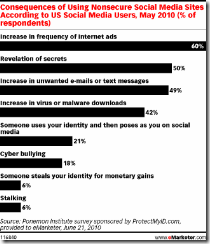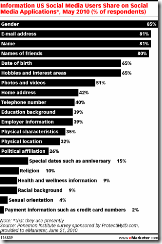Users fear ads more than identity theft
Facebook, which stirred consumer privacy worries in spring 2010 with its rollout of new opt-out initiatives, has not experienced an exodus of users, leaving many industry watchdogs wondering whether web users really do care about online security.
According to a May 2010 study by privacy researcher the Ponemon Institute sponsored by identity theft prevention service ProtectMyID.com, more than three-quarters of US social media users have at least some concern about their privacy and security while using social media, including 28% who say their concerns are serious.
About a quarter of social media users are worried about identity theft on the sites, according to the study, compared with 54% who thought their information might be stolen while banking online and 42% while shopping online. When asked about the consequences they attribute to their own use of nonsecure social sites, the greatest number of respondents cited an increase in the frequency of online ads they see.
That topped the number of people who had had secrets revealed or downloaded viruses, and outpaced by far the number who had had their identity stolen.
While three-quarters of social media users said their security was either important or very important to them, almost half admitted they used social sites that they didn’t trust. Further, only 35% said they chose high security settings for their social media profiles.
And many were still willing to share large amounts of information that, in combination, could potentially be identifying.
Even users who had experienced identity theft in the past did not differ significantly in their practices from the typical social media user.
With just 39% of social media users confident that social networks will protect their privacy, marketers must be careful to avoid any appearance of impropriety. Research suggests users will continue to flock to sites like Facebook and offer them access to large amounts of personal data but will attribute unwanted ads to possible security issues.

























Leave a Comment